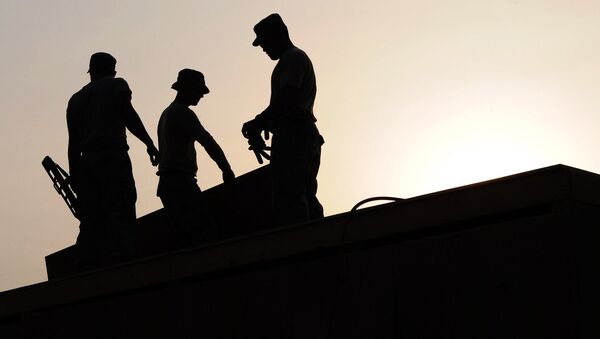A new report Construction and the Modern Slavery Act exposes the business models making it easier for modern slavery to flourish, driven by constant pressure to drive down prices.
"While the construction sector has many risk indicators of exploitation, the potential scale of the problem in the UK is only just emerging," the report states, adding varying levels of exploitation have been found in power plants, hospitals, prisons and big building projects across Britain.
"In the European Union, construction ranks second only to the sex industry as the sector most prone to exploitation," the report says.
Thanks to everyone supporting my new @CIOBreport on #modernslavery risks in UK #supplychains including @UKAntiSlavery @coopukcampaigns @MSHelpline @ShareActionUK @UK_Glaa @policingslavery https://t.co/HkmhctyOdz pic.twitter.com/xn00fdAnc0
— Emma Crates (@CratesEm) May 14, 2018
READ MORE: Modern Day Slavery in Britain 'Laid Bare' By New Report
Scammers are using social media platforms including LinkedIn to target job sites and recruit potential victims. Traffickers groom potential victims who have underlying problems such as debt, addiction or learning difficulties, the report also sites a strong link between homelessness and forced labor.
"Homeless people are particularly vulnerable as they are already cut off from society, friends and family," the report says, with homeless shelters and soup kitchens targeted by criminals.
"People in white vans will turn up and offer people jobs and accommodation. They disappear and are never seen again," says The Salvation Army's Emilie Martin.
"I met a successful Indian businessman who paid the equivalent of £90K to traffickers, believing that he was buying into a British company. He was held as a slave for 15 years," our Emilie Martin tells @theCIOB. Great to work with the construction industry tackling #modernslavery https://t.co/2heUcZX3Tl
— The Salvation Army (@salvationarmyuk) May 14, 2018
There are many people who individually play an essential part in tackling #modernslavery, however, it's as a team that we ensure victims are safe and given a new opportunity at life. https://t.co/mTI65r59iO
— The Salvation Army (@salvationarmyuk) May 14, 2018
Ethical Practice "Priced Out" of Britain's Building Trade
Chris Blythe, chief executive of the Chartered Institute of Building (CIOB) says the construction industry is "normalizing hardship, both for individuals and companies."
"And, whilst these models do not always lead directly to modern slavery, they are creating an environment in which it is easier for exploitation to thrive and criminality to infiltrate supply chains undetected", Chris Blythe says in his contribution to the report.
Read the full interview with @CCShaunSawyer, about how #humantrafficking is increasingly part of everyday #police intelligence briefings, in our publication on the UK #construction industry and the #ModernSlavery Act, launched today. > https://t.co/deyT74sNZu #EndSlavery pic.twitter.com/hc9iGTZrCC
— CIOB (@theCIOB) May 15, 2018
READ MORE: British Businesses Must Do More to Stamp Out Modern Slavery in Supply Chains
Slavery stories from around the UK include Indian sailors paid as little as US$3.28 (£2.43) a hour on North Sea oil fields; Hungarians forced to work on less than US$14 (£10) a week for Kozee Sleep bed factory; Eastern European truck drivers working for Ikea on less that US$4 (£3) an hour.
Kozee Sleep trial: #Batley man found guilty of human trafficking at #Dewsbury bed factory.https://t.co/FPxl22RwBz pic.twitter.com/h21ZqxRbsA
— Dewsbury Reporter (@DewsReporter) January 20, 2016
In January 2017, two brothers were jailed for trafficking 18 Polish men into the UK to work for Sports Direct. They targeted vulnerable men, stole their passports and controlled their bank accounts, stealing US$37 (£35,000) in wages.
https://t.co/NAsgsCCb3P #logistics Modern slavery brothers told to pay back £167,650 — Two brothers have been ordered to pay back £167,650 in criminal gains after they trafficked vulnerable men from Poland to work in a Sports Direct warehouse in Shir… https://t.co/ayIddHRcVY
— Supply Chain Careers — Eric E. Clark & Assoc. (@CareersSCM) January 23, 2018
According to UN Agency International Labor Organization, modern slavery generates US$150 billion globally each year, US$ 34 billion comes from construction, manufacturing, mining and utilities industries.
READ MORE: Report Calls Out British Companies for Not Complying with Modern Slavery Law


